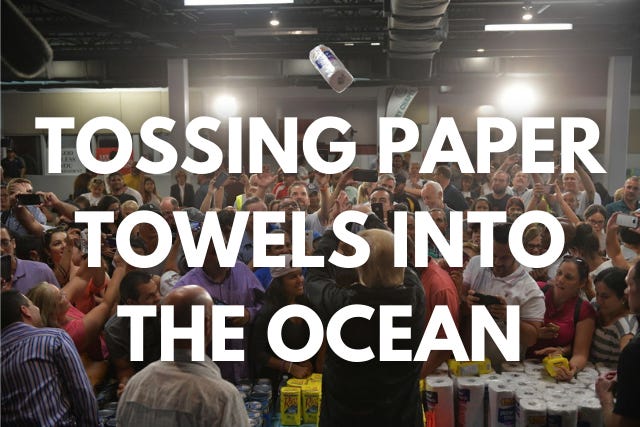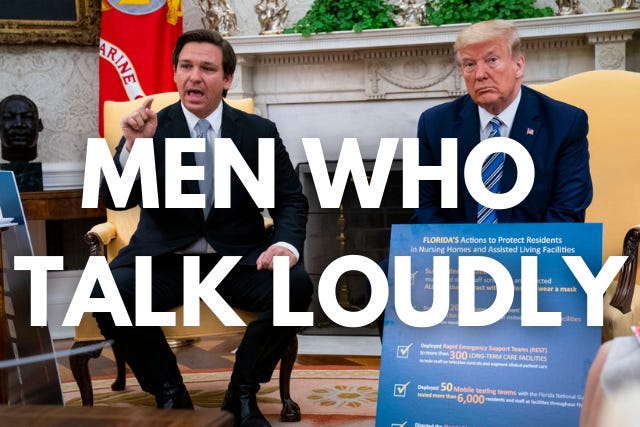Tossing Paper Towels Into The Ocean
Corporate philosophy, public relations, and unrestrained greed have left us with an illusory political system where no one takes responsibility and people are left to die
The sea change is undeniable. President Joe Biden’s rollout of ambitious projects centered on refashioning industry toward clean energy and working to relieve those suffering from the economic crisis is a drastic departure from recent trends. Watching old clips from the Trump Administration now feels like disturbing transmissions from a neighboring reality glitching into our own, and only serve as necessary reminders of how our nation operated only a few months ago. To watch this embarassing, cruel buffoon do anything, from underplaying the threat of the Coronavirus Pandemic to casually tossing paper towels into crowds of suffering people in Puerto Rico, is to remember the madness we’ve just survived.
As I’ve talked and written about, this is a crossroads for the United States of America. Following the disaster that was President Donald Trump, and considering the looming disasters of climate catastrophe, economic crisis, all of it exacerbated by malicious misinformation and a fascistic movement only concerned with power and profit, this moment will either represent a long overdue reconsideration of our past and present or a fleeting sigh of relief before something much, much worse.
If we are to avoid those disasters and somehow right this ship, we must first understand how it is we arrived at this bizarre moment. To watch or read the news is an alarming exercise. On the surface, things simply make no sense. The inexplicable nature of how our politics work, the performative nature that seems to lead to nothing but more and more nothing, feels so far removed from the reality of everyday life in America and every instance, every controversy, every passing minute of the glitzy twenty-four news programs drives home the shocking realization that something…is…wrong.
And something is wrong. Very, very wrong.
Dispatches From A Collapsing State is the home for Jared Yates Sexton’s political, cultural, and historical writings and is an independent project that depends on your support. If you enjoy Jared’s writings, and want access to all pieces and features, including Q&A’s where you can ask Jared your questions, please consider becoming a subscriber.
That Republicans in the state of Georgia have worked relentlessy to disenfranchise the state’s minority voters has been exhaustively and necessarily investigated. The GOP recognizes that an ascendent class of people, those who turned the state blue in 2020 and sent Raphael Warnock and Jon Ossoff to the Senate, threatens their stranglehold on power. Of course, this is nothing new. Following the abolition of slavery in 1863, black Americans were quick to organize and exert their political power, transforming the South before paramilitary groups like the Ku Klux Klan and political oppression in the form of Jim Crow laws, reestablished white supremacy.
What is not discussed as much is how the wealthy and powerful were complicit in these schemes and were more than happy to stay on the sidelines as long as their profit and bottom lines were rewarded. It took the actions of a populist Civil Rights Movement and eventually the federal government to trouble that old order. Now, in an era where Republicans are working nonstop to reinstate these means, it is again the wealthy and powerful who are largely standing on the sidelines.
Though Delta and Coca-Cola have now come out against the bill (the former offering that it “does not match Delta’s values” and the latter a watered-down statement), it is necessary to note that these objections have only come after consistent outrage from people demanding opposition. This is because corporations do not actually have “values.” These statements, often found posted in front of non-threatening, comforting pictures trafficking, usually, in tokenizing images and groups, are brainstormed as public relations tool.
Corporations have one and only one value: profit.
This is the very nature of business and business will find any means possible to profit, including the exploitation and oppression of people. Public relations is a strategized messaging that tells a palatable story about the corporation or individual in order to conceal harsh, disturbing truths about the pursuit of power. Modern public relations began with the work of Niccolò Macchiavelli, whose 16th century work The Prince advised the ambitious to hide their ambitions behind a carefully constructed veneer of piety and empathy. Piety and empathy, however, were actually impediments to power and profit, and were to only be given as much consideration as was necessary to hide the poison.
Public relations developed from this idea and found purchase in the 20th century with burgeoning psychological theories regarding the irrational nature of people, whow ere believed to be driven mostly by their unconscious mind. Masters of PR were charged with accessing these places on behalf of both politicians and corporations, manufacturing consent and fostering desire for products among the populace.
In this current era, Machiavellian tactics are even more in vogue. With a rising trend in progressive support among the people, corporations who have done more to oppress people around the world, including destabilizing their political systems, exploiting their people through sweatshops and slave labor, and contributing to both the crises of climate catastrophe and rising fascism, now must present themselves, at all times, as inclusive, diverse, forward-leaning entities, all so that people will not use their individual buying power to boycott them or, heaven forbid, set off a chain reaction that renders the corporation publicly toxic.
To be clear, at no point in any of this, is the consideration whether people will be helped or respected.
The key is to appear as caring as as necessary while caring as little as to profit the most.
A delicate and horrific balance, for sure.
There is a strange, twisted mirror-image of the Kind Corporation© that has come into focus in recent years, and this new iteration is founded in marketing niches. As most business entities rush to embrace the appearance of inclusivity, diversity, and caring, on the Right an opening has emerged for those who openly care less. In opposing so-called “political correctness” and its current iteration “cancel culture,” marketing opportunities are abound for brands who profess beliefs contrary to what public relations would normally advise.
But make no mistake. They are still driven by the same impulses and are, as always, in conversation with one another. Right Wing anti-woke brands are simply another product in competition with corporate-woke brands. There’s no difference between these “politically opposed” ideas and it represents the same strategies as the “Cola Wars” where two sugar-water companies advertised themselves, respectively, as embodiments of tradition and “the choice of a new generation.”
Donald Trump was both the harbinger of this new era of bad-faith public relations, but also its master. For all of Trump’s incapabilities - and they are legion - it cannot be said that he does not understand, instantly, the two polar positions of any topic, the more controversial, racist, sexist the better, and where he should land in order to maintain his brand. For an understudy, Florida governor Ron DeSantis shows particular potential to follow in Trump’s disastrous footsteps.
Any examination of this current crisis would be incomplete without a review of these principles at work in the Coronavirus Pandemic, which has now killed a minimum of 550,000+ Americans, disrupted society in whole, and laid the foundation for political, financial, and personal suffering that we may not understand for decades. Their willfully misleading statements, obfuscation of the horrible truth, and unethical behaviors, make little sense in what we think of in traditional political terms. In that mindset, we expect our leaders to at least try and handle crises and make the world better.
In our corporate political world, however, trying anything is playing with fire. To try might mean failure. To try means accepting responsibility. Instead, we watched, in Trump and DeSantis, two men talked loudly, pointed their fingers at their opponents, and sought anyone besides themselves to level blame. In the pandemic, they recognized an “unwinnable” situation and instead of playing, they passed the roll of the dice to everyone else, shuffling responsibility from their executive positions to underlings, governors, mayors, businesses owners, anyone who might be willing to take the fall and the responsibility.
Instead of action, we got words and publicity stunts. Corporate actions and public relations. A perfect storm in which government was intentionally derived of power or the ability to help anyone, the buck passed until hundreds of thousands had died, and, in both Trump and DeSantis, personal political brands built on opposition to anything even remotely approaching basic human decency that paid off handsomely in both profit and power.
When the history books are written - if there are history books - the modern Republican Party might be recognized as the first openly nihilistic political movement in modern times. To watch them descend on the border, pantomine the actions of a body who care or intend to do anything of substance, to dress up like border troops, talk tough, and pose for photo-ops, was to watch a coalition of brands jockeying for influence.
Let us be clear: for all of the talk of the border, Republicans do not intend to do anything. It was difficult watching people who should have known better wrestle with Trump’s border wall plans, believing there was an intention to actually stop or even slow immigration. It was never about building a wall. It was about selling people on the idea of building a wall. The idea of doing anything.
Republicans need a “crisis on the border.” It is a political cudgel they use to scare their xenophobic, white supremacist, paranoid base. It’s a Pavlovian trick that works every single time. And, not to mention, Republican constituents, many of them the loudest and angriest voices for border reform, are the same wealthy and powerful individuals who rely on undocumented labor as they can pay them less and deny them benefits. It is a problem that has been created, curated, and maintained by the same people who claim they are the only ones who can fix it.
The GOP’s embrace of nihilistic politics is about symbolism, the appearance of something tangible and real. It is a product that has been fine-tuned, psychologically tested, revised and concentrated, to a) provoke maximum fundraising b) inspire maximum turnout among the base c) legitimize anti-democratic efforts, including gerrymandering, disenfranchisement, and bald-faced power grabs while d) minimizing political risk and liability by never actually doing anything at all about the presented issues.
In this way, the Right has transitioned from actual politics to corporate public relations, a craft that has nothing to do with results and everything to do with power and profit. The appeals are psychological, unconscious pulls at parts of their supporters and consumers who do not understand why they are compelled or why they are afraid. Statements and releases either tout empathy or human concerns which seem genuine but hide dangerous ambition or sell gleeful cruelty, which has become its own shadow orthodoxy on the Right.
What we must recognize is how this has happened and how it has penetrated our reality. To fight against it we have to reckon with the fact that we are, and have been, subjects to incredibly persuasive appeals by corporations and politicians, entities which have relied on tested and honed means to bypass our defenses, influence up surreptitiously, selling us their products and brands because we are so very desperate to see our values, ideas, and perspectives elsewhere in the public sphere. This moment we are in requires actual action. Trends show we are moving in this direction, but corporate interests lie in the continued confusion of public relations and a confusing mixture of the real and the unreal.








Do you mind if I copy and internally share the text from the section about corporations speaking out against the GA voting laws? I was talking about this very thing with the Diversity and Inclusion team at my work this morning and I was touching on some of these points.
Did not know that about Machiavelli as the first PR agent. In fact, I don't know much about him other than the well-worn adage "It's positively Machiavellian!". You must be unearthing all of this in your research for your new book.